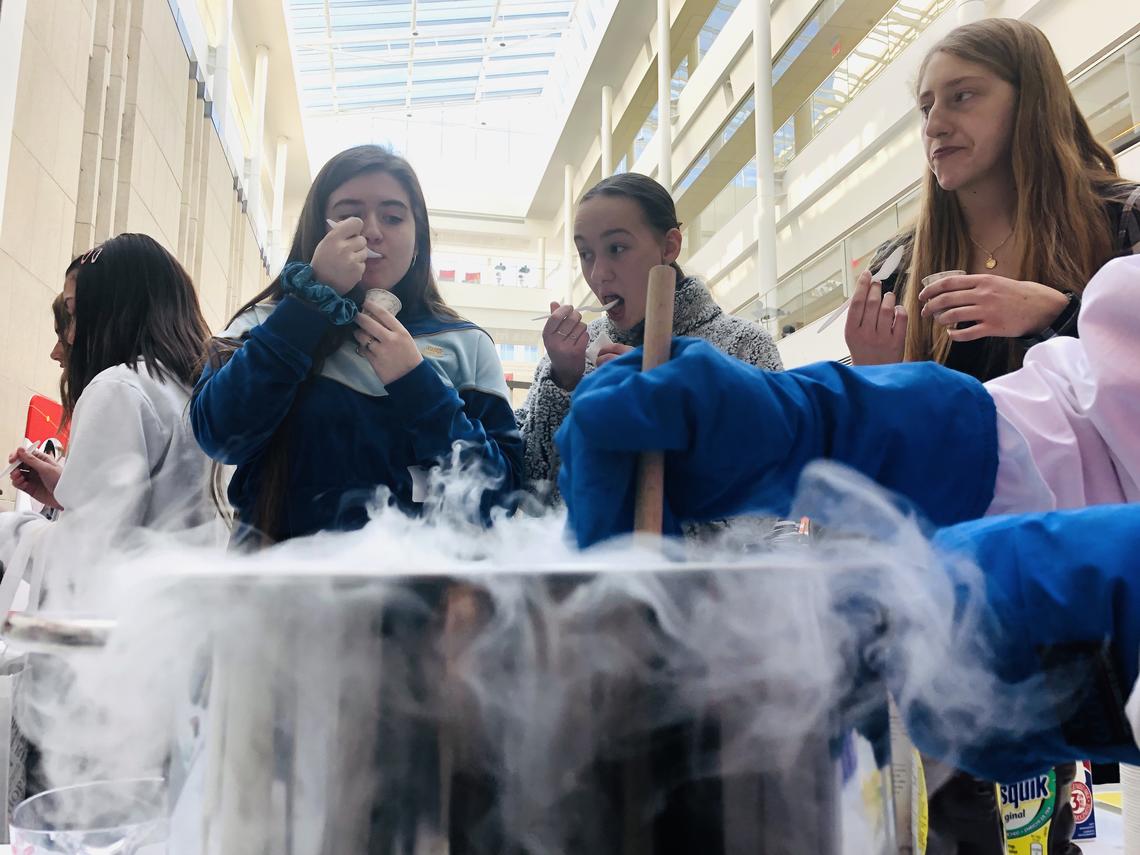March 6, 2020
Events plant the seed of inspiration for women in future STEM careers

For many, it’s a chance to share a few laughs, make new friends, and try interesting things, whether it’s building an eco-friendly water pod or tasting nitrogen-cooled ice cream.
But for some high school visitors, Women in Engineering Day is literally a life-changing event — and what starts as a fact-finding field trip to the Schulich School of Engineering at the University of Calgary ends with a young woman determined to change the world.
“As a high school student, it helped break down stereotypes while revealing that there is no limit to engineering innovation,” explains Laura Fader, keynote speaker at this year’s Women in Engineering Day, and a former high school student who found her own inspiration to engineer at the same fair.
“For me, Women in Engineering Day demonstrated that everyone brought a unique mindset to engineering, and emphasized the importance of creativity and diverse perspectives.”
Mentor for the next generation
She’s come a long way since then, graduating as a chemical engineer and winning the University of Calgary’s President’s Award, while also serving as a volunteer to promote engineering to high school students and young women.
The former president of the Engineering Students’ Society also spearheaded a mentorship program for more than 600 students, all while excelling academically and in extracurricular pursuits. So when Fader says Women in Engineering Day is a launch pad for great things, it’s impossible to argue.
Events like this had a large impact on my goals and ambitions, while providing strong female role models that were making a difference in the classroom and community.
“I think it’s very important to communicate to young women that not only is engineering a great academic and professional choice, it offers you the opportunity to pursue experiences you are passionate about while impacting the world,” Fader says.
Students from across Calgary
This year’s event, held on Feb. 20, saw Grade 10 and 11 students from across Calgary flocking to the engineering faculty, to take part in experiments like strength-testing artificial human bones and building vehicles that can carry and protect a fragile egg.
The students heard from women mentors who’ve gone on to engineering success — and Dr. Laleh Behjat, PhD, says those voices help to show them that STEM is where women belong.
“We are here to inspire these young women and show them the possibilities of a career in engineering, where the ideas and voices of the whole community are needed and welcome,” explains Behjat, professor of electrical and computer engineering.
“It’s our hope that some of the students here today will be the future engineers of tomorrow.”

Women in Engineering Day
Michael Platt
STEM Scope Increases with Operation Minerva
Meanwhile, in the ICT building next door, more excitement was brewing with the arrival of 30 Grade 8 girls on campus.
For the second consecutive year, the office of the Global Research Initiative in Sustainable Low Carbon Unconventional Resources (GRI) hosted Operation Minerva, an initiative that has worked since 1989 to address the underrepresentation of females in STEM fields, by connecting young women in Calgary with female mentors.
As part of this year’s program, the GRI office invited five UCalgary Highly Qualified Personnel to facilitate fun, interactive activities with the group. The mentor team included Dr. Ranjani Kannaiyan, postdoctoral fellow; Ana Cristina Carlotto, chemical engineering grad student; Dr. Emily Bishop, postdoctoral associate in mechanical engineering; Banafshe Felfeliyan, PhD student in biomedical engineering; and Sarah Sanni, mechanical engineering student.
Important steps for the future
The young participants toured UCalgary labs, chatted with researchers about their careers, and engaged in hands-on activities that demonstrated the STEM fields in engaging and immersive ways.
Over lunch they met with Dr. Wendy Benoit, associate dean of teaching, learning, and student engagement in the Faculty of Science, to learn about her journey that led her to pursue a career in STEM.
“I’m grateful to have had the opportunity to talk with this group about my own journey into STEM. It reminded me that all the steps were important, and that there is no way of knowing ahead of time where they will lead.
It takes strength and courage to take steps that feel uncertain, and it takes shared perspectives to remind ourselves that we are strong enough for the journey ahead.
Says Dr. Benoit: “The Operation Minerva program creates a unique chance for girls to know more about what opportunities there are in STEM, and to see the options are attainable, exciting, and diverse.”
Stewarded by the Alberta Women's Science Network and funded by NSERC, the 2020 Operation Minerva program was able to partner directly with schools in Calgary's underserved communities and reach the youth who need it most, therefore making a greater impact with students who may not otherwise have this opportunity. The program guideline produced by this year’s new pilot program will be made publicly available by NSERC, so that communities across Canada have the framework to implement similar youth STEM mentorship programs.

Women in Engineering Day ice cream
Michael Platt
About the GRI
In September 2016, CFREF awarded the University of Calgary, in partnership with the Southern Alberta Institute of Technology (SAIT), $75 million to implement the Global Research Initiative in Sustainable Low Carbon Unconventional Resources (GRI), which aims to significantly reduce the carbon footprint of unconventional resource development and contribute to a climate-neutral energy system.
The Global Research Initiative in Sustainable Low Carbon Unconventional Resources (GRI) is a major vehicle to translate lab-based technology innovations into field-deployable solutions. Focused on collaborative research between the world-class innovators from the University of Calgary and international partners, GRI creates a network of global hubs for discovery, creativity and innovation in unconventional energy research.





